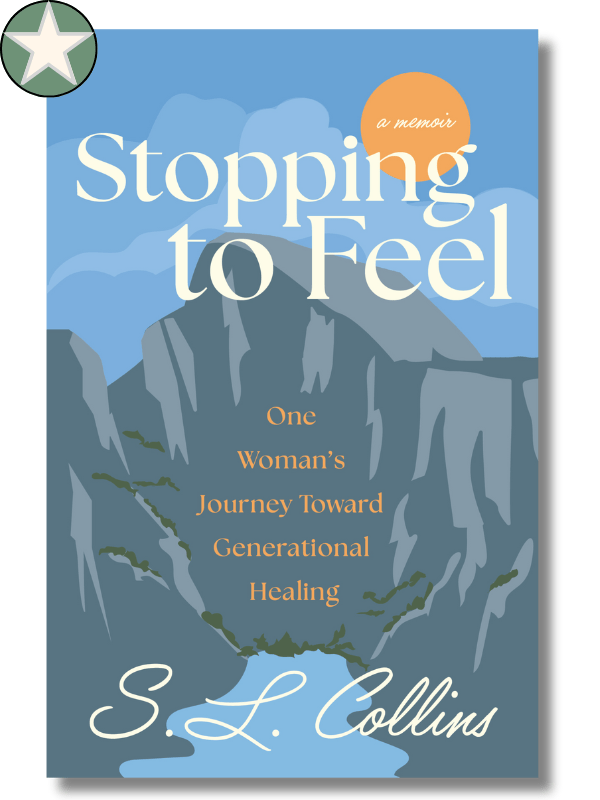Stopping to Feel
by S.L. Collins
Genre: Memoir
ISBN: 9798988975786
Print Length: 280 pages
Reviewed by Samantha Hui | Content warnings: cancer
A vital memoir about the dangers of inheriting silence
S. L. Collins’ Stopping to Feel is an intimate memoir that explores the long-casted shadow of generational trauma, the complex ways we inherit emotional habits, and the courage it takes to unlearn them. At its heart, the book is an examination of grief and deep emotional suppression.
Through lyrical prose and poignant metaphors, Collins delves into the internal fractures that result when love and pain coexist unspoken. She invites readers to reflect on how much of our identity is shaped by what we avoid, and what we can become for others when we finally allow ourselves to feel.
“I was so grateful to have a dad who could fix up the physical wounds, but I wouldn’t realize for two more decades how bad he was at acknowledging and healing emotional ones.”
The memoir centers on Sasha’s relationship with her father, Boris Romanowsky, a devoted police officer admired by his community but emotionally distant at home. As a child, Sasha sees him as a strong and dependable hero, always willing to help others. But his strength doubles as a mask, hiding deep grief and a refusal to confront his own pain and past.
When he is diagnosed with a cancer that has taken the lives of many of his own family members, he faces the disease with a mix of stoicism and denial. As his illness advances, Sasha begins to recognize how his coping mechanisms of avoidance, emotional withdrawal, and constant busyness have shaped her own ways of dealing with life. In her effort to better understand her elusive father, she also uncovers troubling truths about his childhood that shed light on his behavior. The memoir follows Sasha’s path through burnout, therapy, and ultimately, forgiveness, as she strives to break generational patterns and build a healthier emotional legacy for her own children.
“I held on for dear life and kept pedaling–Dad was right, if I just kept moving, I wouldn’t crash.”
The structure of Stopping to Feel enhances its emotional resonance. Divided into four parts—Collins’ childhood and early brushes with family loss followed by her father’s colon cancer diagnosis, his recovery, and the cancer’s return—the book traces not just events but emotional evolution. Told mostly chronologically, the narrative allows readers to witness the slow unfolding of patterns that repeat over generations.
Collins’ talent lies in her ability to reveal, over time, how she and her father mirror each other, how his need to “just keep moving” becomes her own, and how both of them crash under the weight of avoidance. As the book spans decades, we also witness the cumulative effect of anxiety, showing how small emotional habits calcify into lifelong struggles. The structure allows the reader to not only see the cycle but feel how difficult it is to break.
“I remember the stories she told me, but otherwise, my memories come to me as feelings, rather than visions. Confusion. Disgust. Disbelief. Relief. Sadness. Fear. But most of all, shame.”
One of the book’s most powerful strengths is in Collins’ poetic storytelling. A particularly unforgettable image involves her father as a child landing on a stick that breaks off inside his foot, and never telling his parents out of fear of being a burden. Decades later, she wonders whether that fragment still lived inside him as he was cremated: “Did the piece of wood ignite, finally free after all those decades of being ignored?” It’s a haunting metaphor for the buried pain that defines this memoir; wounds left unspoken don’t disappear, they fester, they shape us, and sometimes they become our legacy.
“How could I parent small children and nurture their big feelings and emotions when I could barely understand my own? How could I be a loving parent and a distressed child at the same time?”
Ultimately, Stopping to Feel is about confronting grief, facing uncomfortable truths, and daring to feel in a world and a family where avoidance means survival. It’s a memoir for anyone grappling with emotional inheritance, caregiving, or the silent toll of trauma. Readers who appreciate honest explorations of mental health, family complexity, and emotional resilience will find themselves deeply moved by this story. More than anything, the book is an invitation to pause, reflect, and feel…before it’s too late.
Thank you for reading Samantha Hui’s book review of Stopping to Feel by S.L. Collins! If you liked what you read, please spend some more time with us at the links below.
The post STARRED Book Review: Stopping to Feel appeared first on Independent Book Review.
